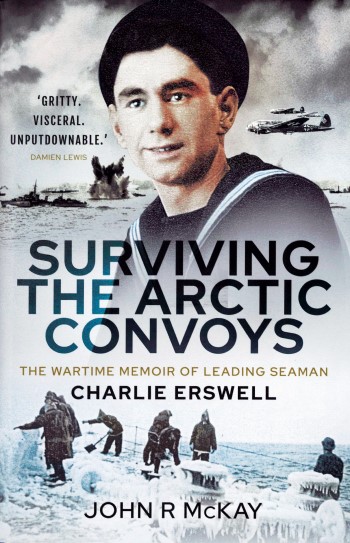Convoy memories from living veteran
Surviving the Arctic Convoys, by John McKay
Shortly after this review was published, leading seaman Charlie Erswell sadly passed away. Nautilus would like to extend condolences to his family.
The story of Britain's war-winning Arctic Convoys has long been sadly neglected. While Second World War battlegrounds from Normandy to North Africa are well known, the Allied convoys of Merchant Navy and military vessels that took vital supplies to support Russia’s war effort have rarely been the subject of books and never of films, and Britain’s Arctic Star medal was only created in 2012.
Perhaps this situation is changing, however, as the convoys finally received their own museum in 2018 – the Russian Arctic Convoy Museum at Loch Ewe in northwest Scotland, which was the starting point for many of the missions.
Writer John R McKay has worked with leading seaman Charlie Erswell – now nearly 100 years old – to bring the story vividly to life. Released on the 80th anniversary of the first Arctic convoy, Surviving the Arctic Convoys is based on Erswell’s records and memories details his time aboard the destroyers HMS Milne and Savage. As well as covering the convoys, it also goes into the many other exploits of this ‘normal bloke who has done a lot of extraordinary things’ – among them the Battle of the Atlantic, D-Day, the invasion of French North Africa and the liberation of Norway.
The gripping prologue, in which Erswell describes an encounter with Luftwaffe bombers, sets the tone of peril that persists throughout – our protagonist nearly dies three times before he even goes to war. In the first chapters things slow down a bit as he shares his background in Berwick-upon-Tweed and Hornchurch, Essex. He describes the harder realities of life in the 1920s, in itself of great interest, and also his struggle to join the Royal Navy against the wishes of his soldierly father.
The narrative speeds up again as the war starts and the young Erswell tries to find a way to 'do his bit'. Too young to join up in 1939, he does early service in London at the 'Stock Exchange Cadet Company' and delivering telegrams while working at the Post Office, though this was hardly a guarantee of safety during the Blitz.
Two weeks before his 18th birthday, he volunteers for the Royal Navy, and so begins an account of his wartime experiences: tense hours waiting for the battles to begin; air raids; U-boat attacks; ocean rescues; deadly cold; and bravery in the face of almost certain death.
We also get a window into life outside of combat, on shore leave during wartime.
All of this is told in such an understated way that it is impossible not to like Erswell. The book certainly gives you an appreciation of the extraordinary courage of which some seemingly ordinary people are capable.
Military history fans are sure to thrill to Erswell's account of combat, and will certainly learn something new. Seafarers may get extra enjoyment in seeing some familiar locations as they were during the 1940s, from the Arctic to the Red Sea, and in having a look at life onboard under the harshest conditions imaginable.
This is a gripping account of a truly remarkable life.
Surviving the Arctic Convoys
By John McKay
Pen & Sword, £19.99
ISBN: 978 13990 13033
Buy this book in the Nautilus Bookshop
While you're there, why not browse the rest of the titles in our unique maritime bookshop, which sells all the books reviewed on these pages.
Buy nowMore Books
The history beneath our hulls
Shipwrecks of the Solent by Richard M JonesThis slim volume of maritime history is a fascinating book to have by your side when you're crossing the busy Solent sea area.
Bicentenary books about a beloved body
One Crew, by Helen Doe, and 200 Years of Lifesaving at Sea, by MirrorpixThe RNLI celebrated its 200th anniversary on 4 March this year. To mark the occasion, two attractive new books have been published: an official history and a 'life in pictures'.
Powerful academic appraisal of life at sea
Sea-Time: an ethnographic adventure, by Helen SampsonFew people have done more than Professor Helen Sampson to raise awareness and understanding of the lives of the world's seafarers.
Health reminder for maritime men
Sailing Through Life, by Nick ArdleyThis book is a helpful reminder to those working in the male-dominated seafaring industry that going for a checkup could save your life.
